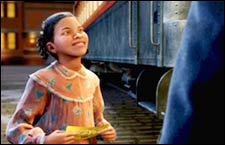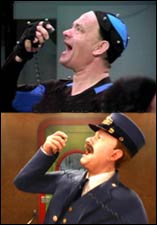Home > Movies > Reviews
Polar Express: Emotionally derailed
Arthur J Pais |
November 10, 2004 14:27 IST
 Its dazzling special effects can fill a transcontinental train. The Polar Express has plenty of cliff-hangers. Emotionally, though, it is sterile.
Its dazzling special effects can fill a transcontinental train. The Polar Express has plenty of cliff-hangers. Emotionally, though, it is sterile.
You get a nagging feel from the very start that the $165 million movie is going to be derailed by a low heartbeat. And this suspicion is confirmed as the film, despite all its technological innovations and awesome, almost surrealistic look -- especially in the 3-D version -- ironically serves to remind the child in us of the importance of human magic in the movies, especially those targeted for the young.
Some of us may be reminded of why James Cameron's $220 million Titanic, the most expensive film of its time, became a worldwide phenomenon in 1998. Despite its jaw-dropping technology and eye-popping sets, it made us genuinely care for its lead characters. But, eight years before Titanic arrived, the same filmmaker's technically superb underwater saga, The Abyss, proved a big box-office disappointment because it was emotionally frigid.
 | More on rediff.com ! |  | |
|
Unlike director Robert Zemeckis' benchmark hit Back to the Future -- which is filled with rich humour, heartfelt emotions and splendid adventure -- the new film offers very little mirth, humour or emotional payoff.
It is impossible to take your eyes off the screen when the train goes on a wild ride through plunging rails, or the two children try to retrieve a lost ticket by walking over the train's roof. While its computer generated, utterly innovative images and 3-D effects will be long talked about, many viewers might find Tom Hanks decidedly disappointing. He gives his voice and body movements to many characters including a rather intriguing train conductor and Santa Claus. But Hanks, one of the most gifted of Hollywood actors -- he also has an amazing range of voices -- is rather cold for most part.
Though the film is entirely computer animated, its actors shot their scenes on bare soundstages wearing tiny reflective dots, allowing their scenes to be digitised and shaped by the computer. So Hanks 'plays' the boy, his father, the conductor, a hobo and Santa.
In the final reckoning, though, the film's technology does not succeed in recreating vivid facial expressions.
Based on Chris Van Allsburg's bestselling kids classic published about two decades ago, the film starts on one snowy Christmas Eve when a long, long phantom train pulls up outside the house of a young boy, who, like the other kids in the film, is nameless. The conductor nudges the boy, known as Hero Boy in the script, on to the train.
He may not believe in Santa Claus but Hero Boy dares to stop the train when a boy on the other side of the tracks fails to get on.
 On the train our hero gets to know a young black girl (movements supplied by Nona Gaye) and the lonely boy (Peter Scolari) who had almost missed the train. The latter is so shy and so lacking in self-confidence that he cannot bring himself to sit with the other children. And then there is the know-it-all boy (Eddie Deezen), who is convinced he will be Santa's favorite.
On the train our hero gets to know a young black girl (movements supplied by Nona Gaye) and the lonely boy (Peter Scolari) who had almost missed the train. The latter is so shy and so lacking in self-confidence that he cannot bring himself to sit with the other children. And then there is the know-it-all boy (Eddie Deezen), who is convinced he will be Santa's favorite.
Apart from various dangerous situations the sceptical boy, the black girl and the lonely boy face, they also have interesting encounters. The one involving a hobo (voiced by Hanks) on the roof of the train is mildly amusing. More important to the film are the life lessons the kids learn about leadership, trust, humanity, humility -- and believing.
The film's appeal is dimmed considerably because the screenplay does not create enough situations to make us care for the kids. A few years ago, Zemeckis was accused by critics for turning Forrest Gump into a heavy sentimental drama. And yet that film, despite its own overwhelming technological tricks, managed to touch the heart. This one is riding the wrong track.
Though children are the only passengers on the train, no effort is made to show them attempting to understand each other on their unique journey. The interaction between the children and the train conductor does not create any spark either. Worse, not a single character is fully fleshed.
The movie will have to earn at least $500 million worldwide in movie theatres and in video, DVD rentals and sales before it recoups its investment. If it turns out to be a huge hit, it will mean one thing: For once, kids too have embraced a film because the thrilling ride it provides; the fact that it had an emotional vacuum did not matter.
CREDITS:
Screenplay: Robert Zemeckis and William Broyles Jr, based on the book by Chris Vans Allsburg
Starring: Tom Hanks, Nona Gaye, Peter Scolari, Eddie Deezen
Direction: Robert Zemeckis
Running time: 1 hour 40 minutes
Rating: G